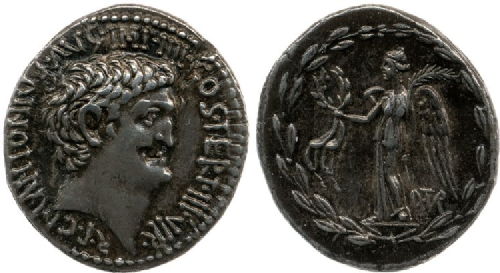All 1 entries tagged Rrc 545
No other Warwick Blogs use the tag Rrc 545 on entries | View entries tagged Rrc 545 at Technorati | There are no images tagged Rrc 545 on this blog
April 01, 2017
Antony's retaliation to Augustan propaganda
 |
|
Denarius of Mark Antony (RRC 545/1), 31 BC
Obverse: Bare head of Mark Antony, M·ANTONIVS·AVG·IMP·IIII·
COS·TERT·III·VIR·R·P·C
Reverse: Victory standing left holding wreath tied with fillet in right hand
and palm-branch over left shoulder with left hand. Laurel-wreath as border. D·TVR
|
The battle of Actium in 31BC was the most important event in Augustus’ campaign of justification after assuming more power and influence than any other individual. This battle was the climactic clash between Augustus and Antony in 31 BC, in which the victor would gain control of the Roman world. We may be tempted to think of this battle as a symbol of the triumph of a military despotism, but Augustus used a multitude of methods to convince the Romans otherwise. But Augustus himself unwittingly confirmed his misdoings: the Res Gestae opens with brazen assertions of high treason and a cliché-ridden defamation of a consul of the republic. Augustus was therefore forced to cleverly exaggerate the extent of his victory by following a systematic denigration of Antony. The reason for Augustus’ campaign against his enemies was to debase their character and make their deposition seem as far from a power struggle as possible, hoping instead that he would appear as the bulwark against immoral and dangerous individuals for the Romans. This was a countermeasure to seeming as if he was declaring war on Antony for his own private interests. The Antony of Cicero, associated with prostitutes and corteges of actresses and often drunk is the foundation of Augustus’ Antony. This disparagement of Antony was important in denying monarchical claims to power, it characterised Antony as unsuitable for power and dangerous to the republic, which forced Augustus to champion the defence of the republic. This was similar to the character assassination of Sextus Pompey. Augustus branded Sextus as a pirate, rather than admit to engaging in civil war: ‘I pacified the sea from pirates ’ (Res Gestae 25), preferring to claim he acted out of compulsion and loyalty to the state.
Augustus confronted Rome with ‘the will which Antonius had left in Rome, naming his children by Cleopatra among his heirs, opened and read before the people ’ (Suetonius, Life of Augustus, 17). It allowed Augustus to reassert this status as the champion of the Roman people, however it is exceptionally pertinent to remember that Augustus’ extortion of the vestal virgins in procuring this will was something wholly illegal. Augustus juxtaposed himself and Antony through his mausoleum. Though completed in 28BC, it was important in the propaganda war: Augustus’ monumental tomb offered a demonstrative and public contrast to Antony’s alleged desires to be buried in Alexandria. This may have encouraged the Romans, in their indignation, to believe that the other reports in circulation were also true: if Antony should succeed, he would bestow their city upon Cleopatra and transfer the seat of power to Egypt.
Despite Augustus’ best efforts to brand Antony as traitor, Antony’s denarius of 31 BC shows a different story. The coin depicts Antony with a full list of titles, advertising his role as augur (AVG), imperator for the fourth time (IMP IIII), consul for the third time (COS TERT) and triumvir (III·VIR·R·P·C). This was an undeniable assertion that he was far from a foreign enemy, suggesting instead that Augustus’ behaviour was exceptionally anti-republican (to openly share such enmity with a fellow Roman would be a source of revilement). Antony’s use of a denarius is wily; it reaffirmed his legitimacy as a member of the Roman elite while suggesting Augustus’ lust for power as a man willing to enter into civil war for supremacy. The reverse features Victory standing left, a blatant reminder that it would be Victory who supported Antony. The denarius openly deconstructed Augustus’ campaign of invective and propaganda; it was a poignant reminder to the people of Rome that Antony was not the Eastern enemy he was made out to be.
 |
This month's coin entry was written by Alfred Wrigley. Alfred is a third year Ancient History and Classical Archaeology student with a great research interest in Julio - Claudian numismatics
Image copyright Trustees of the British Museum (1855, 1118.3)
 Clare Rowan
Clare Rowan

 Please wait - comments are loading
Please wait - comments are loading

 Loading…
Loading…

